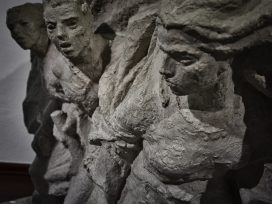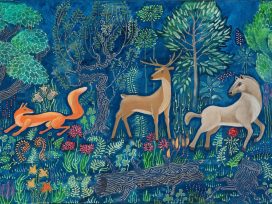What role can cultural journals play in relation to other media? How should they combine text with images and photographs? Can they be supported by salons, readers’ groups, etc? These themes, and others, occupied discussions among European cultural journalists and editors in September 1983, as they met at a conference in Bossey, Switzerland. Behind this welcome initiative stood the genial and enterprising Hans-Götz Oxenius, head of cultural broadcasting at the Westdeutscher Rundfunk (WDR) in Cologne, which fully financed the event. Over the course of three days, representatives of some 25 publications had the pleasant opportunity to discover that they shared the same passions – and, alas, many of the same problems. Notably, but perhaps not entirely surprisingly, the French revues were the great absence from this meeting, barring a couple of exceptions. Oxenius had nonetheless redoubled his efforts to encourage more of them to participate – and in many cases, did not even receive a reply. This rejection (or indifference; interpret it as you will) could only reinforce the views of those who see French intellectuals as too Franco-centric: dreaming of the universe, seeing no further than the Left Bank of the Seine. Truly not a source of pride.
Cultural journals from other countries were more supportive. Many replied to the summons: from Italy (
la Gaula, Alfabeta, Sottospra), Germany (
Tumult, Merkur, Kursbuch), Sweden (
BLM, Ord&Bild), Norway (
Samtiden), Finland (
Parnasso), Holland (
Raster), England (
Stand), Denmark (
HUG), Yugoslavia (
Praxis), Switzerland (
Der Alltag), Austria (
Wespennest) and even Iceland (
Tímarit Máls og Menningar). Just skimming their pages shows how open most are to foreign intellectual trends, willing to seek out writers and writing from beyond national boundaries. French texts, for example, are frequently introduced, translated, and analyzed: the works of Michel Foucault, Roland Barthes, Paul Virilio or Jean Baudrillard in the humanities, or the poetry of Paul Valéry or Henri Michaux.
The depth and diversity of experiences presented over these days left no moment for boredom or repetition. Faced with such numerous and compelling exchanges, it was only natural to plan for some kind of continuation.
Thus a second meeting (again funded by WDR) took place in October 1985, in Urbino, Italy. Many of the original participants returned, and were joined by newcomers – notably French (Esprit, Projet, Lettre Internationale), but also Spanish (Quimera) – for discussions just as fruitful as before. At Oxenius’s suggestion, these focused in part on debating a set theme: the survival of the Enlightenment through cultural journals. The question is most crucial for those journals which have long been a means for the spread of the Enlightenment, as Lothar Baier (contributor to the excellent German journal Freibeuter) recalled during his succinct introduction. Skipping over the daily problems which threaten the producers of cultural journals, he rather addressed the fundamental questions which will determine their future, even their purpose. In this light, his international overview was entirely worthwhile – it certainly succeeded in giving perspective to a dialogue often confined to a merely national level. Other sessions brought news from countries where the situation for cultural journals is not always rosy. Spanish intellectual life, reported the editor of Quimera, remains very dependent on foreign trends, and journals there have also felt the impact of rising nationalism, and the increased provincialism which has accompanied it.
Meanwhile a preliminary comparison of funding systems for cultural journals made clear the decisive role of state support in most countries (including Spain, Norway, and Austria), even if the golden age is over, and journals must increasingly come to terms with declining subsidies. Naturally enough, this discussion of financial support followed a presentation by Jean-Louis Schlegel, editor-in-chief of the journal Projet, on “critiques of the welfare state” and the resurgence of neoliberal thought – again picking up the theme of Enlightenment, the Ariadne’s thread running through this conference. As these days of conversation ended, Oxenius had just cause to savour his success in bringing together European journals. The final triumph was a notable presentation by Antonin Liehm, of Lettre internationale, a journal with multiple language editions and the ambition to publish a cultural journal at a truly European level – that is, overcoming the separation of East and West.
Informally, these two gatherings have spawned a network of friendship and collaboration – a network which la Revue des Revues will be counting on to help open its future editions to the contemporary world of European cultural journals. A third meeting, in 1987, was planned on the spot in Urbino. Journals in Barcelona, Paris and Annecy have put themselves forward as organizers: a contest as fierce as that to host the Olympics. Cultural journalism is a funny old game…






